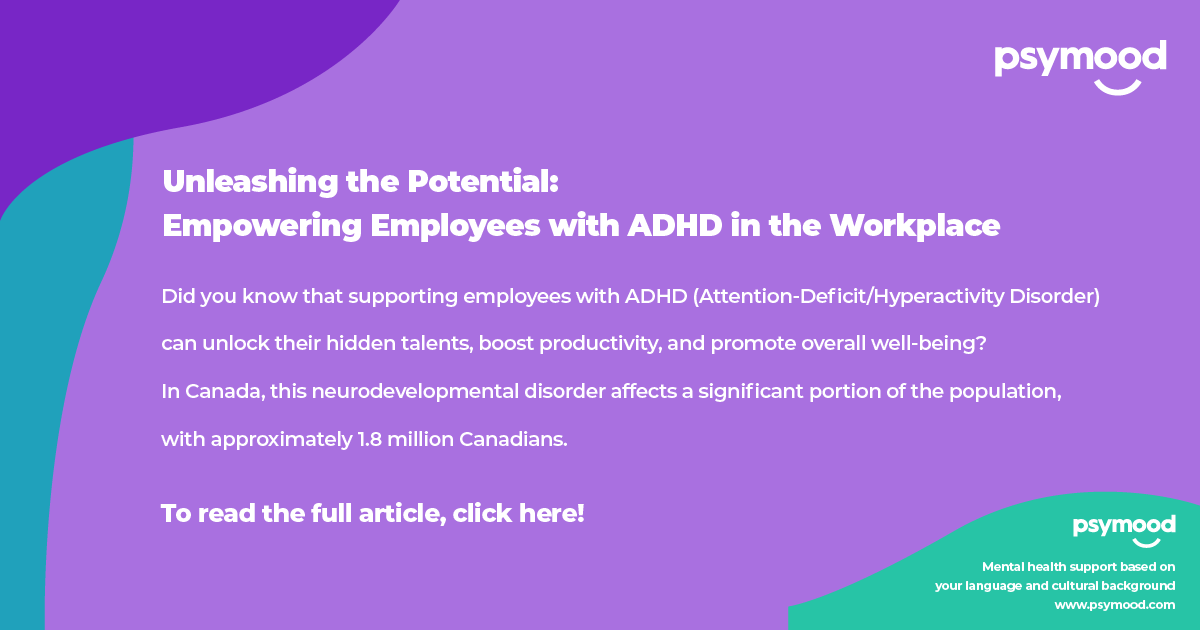Unleashing the Potential: Empowering Employees with ADHD in the Workplace
Did you know that supporting employees with ADHD (Attention-Deficit/Hyperactivity Disorder) can unlock their hidden talents, boost productivity, and promote overall well-being? In Canada, this neurodevelopmental disorder affects a significant portion of the population, with approximately 1.8 million Canadians, or 4-6% of adults and 5-7% of children, facing its unique challenges. That means 1 in every 21 people in the country navigates ADHD daily. In this article, we delve into strategies to support and raise awareness of ADHD in the workplace, assuming the employee has voluntarily disclosed their disability.
Note: It’s essential to respect an individual’s decision regarding disclosing disabilities to their employer.
What is ADHD?
ADHD, short for attention deficit hyperactivity disorder, is a condition that affects individuals of all ages, with diagnoses becoming more prevalent across Canada. While many people are diagnosed during childhood, others may receive a diagnosis later in life due to less common symptoms. ADHD impacts behaviour and is rooted in certain areas of the brain. It influences problem-solving approaches, planning abilities, interpreting others’ actions, and impulse control. People with ADHD may exhibit challenges in maintaining focus, restlessness and impulsive actions.
The Symptoms of ADHD
ADHD symptoms manifest uniquely based on age, with children and teenagers exhibiting distinctive patterns, However, several common indicators can help identify this condition
- Having a short attention span and being easily distracted
- Difficulty listening or carrying out instructed tasks
- Excessive moving or talking
- Acting without listening
- Little or no sense of danger
For more info: Diagnosed with ADHD? How to cope & understand your new diagnosis
Nurturing an ADHD-Inclusive Workplace
When an employee bravely discloses their ADHD, tailoring accommodations is key to fostering a supportive environment. Start by understanding their needs, potential triggers, and desired support. Here are some ingenious ideas to empower ADHD individuals:
- Master the Art of Clarity: Effective communication demands clear, concise instructions delivered both verbally and in writing.
- Tame the Task Tiger: Break down assignments into manageable steps, aiding those with ADHD who struggle with information processing.
- Structure Spells Success: Establish a structured work environment with routines, schedules, and deadlines. Consistency and predictability empower ADHD individuals to stay organized and focused.
- Goal Guru: Help employees prioritize tasks and set achievable goals. Embrace visual aids like calendars, to-do lists, and reminders, complemented by digital tools and task management apps for streamlined organization.
- Power in Strengths: Assign projects and tasks that align with their unique strengths, unlocking their full potential.
- Feedback Forte: Provide regular, supportive feedback and constructive criticism. Acknowledge and celebrate strengths and accomplishments, fostering motivation and self-esteem.
By fostering an ADHD-friendly work culture, we ignite productivity, harness creativity, and cultivate an inclusive environment where everyone can thrive.
Overcoming Cultural Stigma: Embracing ADHD in the Workplace
ADHD continues to be a significantly under-recognized and misdiagnosed condition in Canada, partly due to the lingering stigma surrounding neurodevelopmental disorders. Cultural biases and societal norms can shape perceptions of what is considered «proper» behaviour, potentially hindering ADHD awareness and acceptance. To dismantle this stigma, fostering advocacy, awareness, and patience within the workplace is crucial.
- In certain cultures that prioritize conformity and obedience, symptoms associated with ADHD, such as impulsivity and disruptive behaviour, may be negatively perceived, leading to underdiagnosis or misdiagnosis. Conversely, cultures that value assertiveness or risk-taking may exhibit higher tolerance for hyperactive symptoms. It is essential to engage in open discussions about acceptable behaviour expectations in different work environments and, if necessary, educate colleagues about ADHD.
- Cultural beliefs and stigma surrounding mental health can impact individuals’ willingness to seek help for ADHD. Some cultures stigmatize mental health conditions, resulting in a reluctance to pursue assessment and treatment. Additionally, cultural attributions of ADHD symptoms to personal weaknesses or spiritual factors can further influence help-seeking behaviours. It is important to approach questions from curious colleagues with an open mind, viewing them as opportunities to educate and raise awareness about ADHD
Empowering Employees with ADHD: Going Above and Beyond
When it comes to supporting employees with ADHD, providing additional accommodations can make a world of difference.
- Embrace flexible work arrangements, granting the freedom to work from home or adjust hours. Emphasize the importance of regular short breaks for movement or meditation to enhance focus and manage restlessness. Benefits of Exercise on Mental Health
- Create an optimal workspace by minimizing distractions and offering noise-canceling headphones.
- Consider offering access to employee assistance programs and valuable mental health resources, like PsyMood. You can tailor the support by narrowing down the specialist. Search under «diagnosis» and select «Neurodevelopmental Disorders.” Additionally, provide any additional counseling, coaching, and mentoring services to enable individuals to develop effective strategies for managing ADHD-related challenges.
Remember, open communication and understanding each individual’s unique needs are the keys to success. Share your company’s challenges in the comments below.
Let us know below in the comments section about any challenges you face at your company.
PsyMood offers Enterprise solutions for small, medium and large companies. For more information, email us at partnerships@psymood.com.
PsyMood is a digital tool designed to help you find the support you need in the language that you are most comfortable with. PsyMood considers cultural background, geographical location, interests, and personal needs, amongst other factors, to pair you with service providers for either online or in-person therapy sessions.
More Resources
Diagnosed with ADHD? How to cope & understand your new diagnosis, Benefits of Exercise on Mental Health, Specialists who work with Neurodevelopmental Disorders


.png)
.png)
.png)
Recent Comments